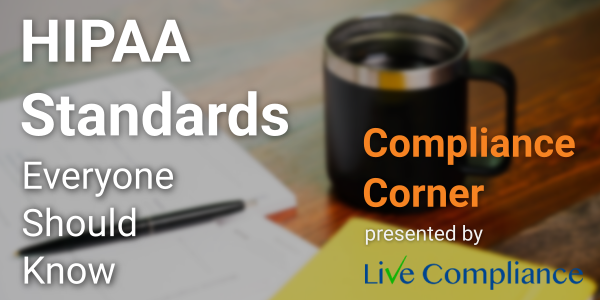
Aug 15, 2022 | Live Compliance, Partner
HIPAA Training Standards Every Business Associate Needs to Know
Per the HIPAA Privacy Rule and HIPAA Security Rule, both Covered Entities and Business Associates, must require HIPAA training for all workforce members that access protected health information (PHI) or electronically protected health information (e-PHI) in any of its forms and should be provided “as necessary and appropriate for the members of the workforce to carry out their functions within the [organization].”
According to the Rule, training must be provided “to each new member of the workforce within a reasonable period of time after the person joins the [organization’s] workforce.” Along with all other annual compliance requirements, HIPAA training is arguably the most important. Your workforce members are your first line of defense in the event of a Breach and must be able to identify your organization’s designated HIPAA Security Officer, and have a firm understanding of the HIPAA Privacy and Security Rule. Training should also highlight the organization’s Technical, Administrative, and Physical Safeguard objective security requirements. It is best practice to provide ongoing security awareness training and, in addition to the mandatory annual training, the Privacy Rule also highlights what’s known as “periodic” training. The goal is to ensure workforce members’ knowledge of HIPAA compliance is not forgotten.
It’s advisable that HIPAA training is given to all employees as new hires during the new employee orientation period, and before new employees are exposed to or work with individually identifiable health information. This includes officers, agents, employees, temporary employees; like students, interns, volunteers, and salespeople. At a minimum, training should cover the basics of HIPAA, the basics of privacy and security requirements and restrictions, and policies and procedures. All new hires need to be provided HIPAA training and a post-test on the material covered within the training course to ensure comprehension of relevant and appropriate HIPAA policies and procedures. Security Officers should be trained on the Breach Notification Rule, Minimum Necessary Rule, and the Organization’s policies and procedures.
The HIPAA Privacy Rule states that “An [organization] must document that the training as described [in the HIPAA Text] has been provided.” Failing to do so will be seen as “willful neglect” and will result in HIPAA violations including monetary penalties as high as $1.5 million dollars. A minor violation may only result in a corrective action plan requirement, whereas a significant data breach attributable to a lack of training will be viewed more seriously.
At Live Compliance, we make checking off your compliance requirements extremely simple.
-
-
- Completely online, our role-based courses make training easy for remote or in-office employees.
- Short informative video training to meet periodic training requirements
- Depending on the size of your organization training may start as low as $79
Call us at (980) 999-1585 or visit us online at www.LiveCompliance.com/ezclaim
ABOUT EZCLAIM:
EZClaim is a leading medical billing, scheduling, and payment software provider that combines a best-in-class product with exceptional service and support. For more information, schedule a consultation today, email our experts, or call at 877.650.0904.

Jun 10, 2020 | Administrative Safeguards, Live Compliance, Partner
On March 26, 2020, Washington D.C significantly amended its Data Breach Notification Law (D.C. Act 23-268), to expand the definition of personal information and require businesses obtaining such information to implement “reasonable security safeguards”. The new law took effect on May 19, 2020, in the midst of dramatic societal change. Indeed, COVID-19 has accelerated the digital transition and hastened the need for security and privacy issues to be at the forefront of the state legislature. So, what are the major changes and updates under the D.C Act 23-268?
The definition of personal information has been significantly expanded and includes several new elements. Previously, the law only considered personal information to be a person’s first name (or initial) and surname and sensitive identifying numbers i.e. social security number, driver’s license number, D.C identification card number, or credit card number.
Personal information also included a combination of a person’s name and any codes that would enable access to a person’s individual financial or credit account. The current update expands the definition of what is classified as personal information to the following:
- Unique Identification Numbers: passport number, taxpayer identification number, or any other identification number issued on a government document.
- Medical Information: DNA profile or genetic, biometric, or health insurance information.
- Financial information: Account number or any numbers or codes allowing access to an individual’s financial or credit account.
- Other Data: Any listed data that would allow an individual to carry out identity theft. The new legal definition also includes any username or email address combined with any information allowing access to another’s personal account.
Mandatory Breach Notification
- C Attorney General Notification Notices:
The law previously only required the D.C Attorney General to be notified if over 1,000 residents were affected by a data security breach. It now requires the D.C Attorney General to be notified when a qualifying data breach affects 50 D.C residents or more. The notice must include the nature and cause of the data breach, the number of affected residents, types of personal information compromised, and corrective steps that have been taken.
- Individual Breach Notification Notices:
Affected residents must also be notified ‘’in the most expedient manner possible, without unreasonable delay’’. New content requirements for individual breach notification notices include the types of data compromised and toll-free numbers for credit reporting agencies and the D.C Attorney General.
Business and Service Provider Security Requirements
Businesses and service providers are now subject to more stringent security protection requirements. Any organization handling D.C residents’ personal information must “implement and maintain reasonable security safeguards”. The amended law also stipulates that any entity using a third-party service provider must have a written agreement in place requiring the latter to “implement and maintain reasonable security safeguards”.
Failure to comply with the new legal requirements of the new Data Breach Notification Law and to implement and ensure “reasonable security safeguards’, there could be a significant economic and reputational loss.
To assist you in identifying the extent to which your organization is at risk of a data breach, Life Compliance is offering a FREE Organization Assessment to determine your company’s specific vulnerabilities and risk exposure to cybercrime. This will ensure you have the best possible insight and protection as you guide your company into the digital future.
Live Compliance provides all of your HIPAA privacy, security requirements, and measures. HIPAA compliance is a requirement for Covered Entities and Business Associates to safeguard personal, private, and protected health information. Organizations can excel in health care without the struggle of compliance requirements.
Live Compliance is a preferred partner of EZClaim, and their software is integrated into our medical billing software. For detailed product features or general information about EZClaim medical billing solutions, visit our website, contact us via e-mail, or call our support team directly at 877.650.0904.
[ Written by Jim Johnson, President of Live Compliance ]

May 12, 2020 | Live Compliance
Ransomware Targeting Medical Billing Companies
As the number of healthcare providers taking advantage of Telehealth increases during this uncertain time, the number of ransomware attacks continues to increase as well.
Ransomware is a type of malicious software designed to block access to a computer system until a sum of money is paid. Microsoft says, “Multiple ransomware groups that have been accumulating access and maintaining persistence on target networks for several months activated dozens of ransomware deployments in the first two weeks of April 2020.”
The attacks are targeted towards aid organizations, medical billing companies, manufacturing, transport, government institutions, and educational software providers, however, Microsoft says that it doesn’t stop with critical service groups and suggests all networks are aware of these attacks and taking necessary steps to limit risk. NetWalker ransomware, for example, gained notoriety for targeting hospitals and healthcare providers with e-mails claiming to provide information about COVID-19.
Have you had an Accurate and Thorough Security Risk Assessment and/or penetration testing?
If you haven’t completed an accurate and thorough security risk assessment, you could also be penalized under ‘willful neglect’ (this category alone is $50,000 per violation!) in addition to the higher risk of ransomware attacks. What we do is keep this from ever being a worry for you! We perform your security risk assessment and manage all of your requirements, in a clean, organized cloud-based portal.
Don’t risk your company’s future, especially when we are offering a FREE Organization Assessment to help determine your company’s status.
It’s easy! Call us at (980) 999-1585, or email me, Jim Johnson at jim@LiveCompliance.com or visit
www.LiveCompliance.com
Live Compliance has partnered with EZClaim medical billing software to strengthen what they can provide for you. It provides all of your HIPAA Privacy, Security Requirements, and Measures. HIPAA compliance is a requirement for Covered Entities and Business Associates to safeguard personal, private, and protected health information—allowing organizations to relinquish the struggle of compliance requirements.
You can investigate the EZClaim medical billing software by either downloading a FREE DEMO or just contact our knowledgeable sales staff to answer any and all of your questions by phone at (877) 650-0904 or by e-mail at support@ezclaim.com.
[ Contributed by Jim Johnson of Live Compliance ]




